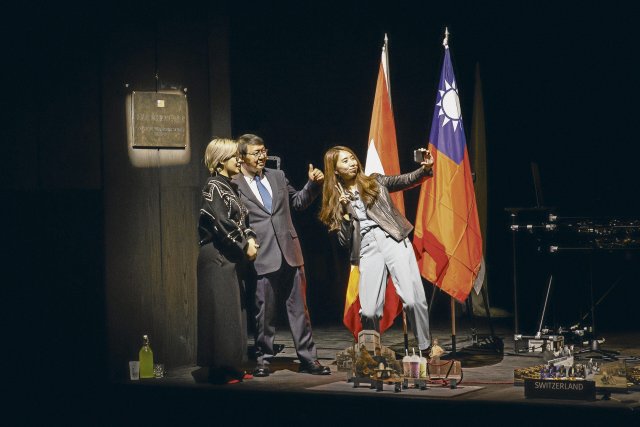The three Taiwanese protagonists clearly took a stand with self-irony and well-measured jokes.
Photo: Claudia Ndebele I This is not a message (Made in Taiwan) Can only be used free of charge as part of reporting on the project “This is not a message (Made in Taiwan)”
Frighteningly influential forces in the United States believe that war with the People’s Republic of China is inevitable to defend its status as the “sole world power.” And they want this to be carried out as long as there is still a chance of success. The island of Taiwan, which is armed to the teeth by the US, is a trump card when it comes to fueling this conflict. For a long time, a peaceful settlement was possible if the West at least officially recognized Beijing’s “One China policy”; The island was nevertheless assured of its existence as an independent state. This apparently no longer applies. In this situation, Stefan Kaegi from the Berlin theater collective Rimini Protocol brings a play about Taiwan to the stage. A differentiated approach to a delicate situation that can be viewed from many perspectives? Not even close.
Kaegi leaves the stage to three Taiwanese – David Chienkuo Wu, an experienced diplomat, Debby Szu-Ya Wang, a young musician who knows Europe and whose father has built a bubble tea empire, and finally Chiayo Kuo, a lobbyist whose profession is to pull out all the stops on social media to advance Taiwanese interests. So there are at least two protagonists who clearly represent state interests. The three speak good English and bring a charming infotainment show to the stage – with self-irony, well-measured jokes and the weight of their biographies. This is what anyone who wants to collect sympathy points at international conferences or does fundraising does.
Cardboard backdrops of buildings in Taipei – an earthquake-proof skyscraper serves as a metaphor for the oh-so-resilient people – and family photos are projected onto a large screen, Debby Szu-Ya Wang provides the musical framework, Chiayo Kuo talks about her experiences in Kosovo Apparently she considers her independence efforts to be exemplary. The entertaining tutoring about the Republic of China is heading towards the dramatic climax, the disgrace of 1971, when Richard Nixon decided to make his peace with the People’s Republic, which resulted in the Republic of China being kicked out of the UN and hardly anyone left diplomatically wanted to maintain relations with the island nation. The theater evening with the title “This is not an embassy (Made in China)” culminates in the fictional opening of a Taiwanese embassy in Berlin – covered by artistic freedom. In reality that would be difficult to imagine. An AI has designed a representative hall, speeches are made, Wu sings the anthem with fervor. The audience also learns that it is almost impossible to find Taiwanese flags in Berlin. One would rather not imagine that they could one day be as omnipresent as the Ukrainian ones are today.
When the “Embassy” sign is unveiled, the audience cheers loudly. Is there already a majority in the Berlin Festival House that would think it right to stand up against China with the “Western community of values”? It’s not like the three Taiwanese ambassadors agree on everything. Sometimes they hold up a sign that says “I disagree.” For Wu, the diplomat, Chiang Kai-shek, the country’s founder, is a hero; for the women, he is a dictator. They also do not share his hope for reunification with China. At one point Wu, the diplomat who had to work in substitute embassies disguised as liaison offices, gets to the crucial point. If he could ask US President Joseph Biden one question, he would ask him why he allowed his party colleague Nancy Pelosi to fly to Taipei – a senseless provocation! That would also be recognition of the Republic of China by Germany. The patriotic trio does not hide the fact that this would involve high costs. But shouldn’t that be a risk for a “values-driven” foreign policy?
In the end, the Taiwanese influencers have the audience where they want it, and the fictitious vow is made: Would Germany support Taiwan in the event of a Chinese attack, would Germany supply weapons? The embassy sign is unscrewed again at the end. One would hope that the visitors would leave the theater as Taiwan’s honorary consuls and that one could rely on them if things really got tough.
If what is to be feared happens, i.e. if the USA soon leads EU-Europe into a confrontation with the People’s Republic of China, then the “main media” will certainly serve us many more sympathetic stories about the great democracy off the coast of China . However, seeing it presented to you in the theater is strange. Is that really not supposed to be a message?
No further performances are planned at this time.
Subscribe to the “nd”
Being left is complicated.
We keep track!
With our digital promotional subscription you can read all issues of »nd« digitally (nd.App or nd.Epaper) for little money at home or on the go.
Subscribe now!
